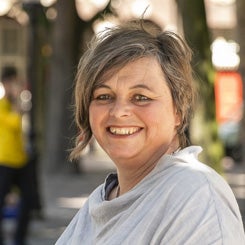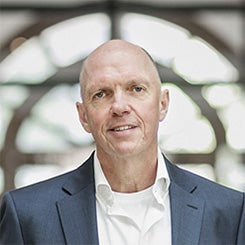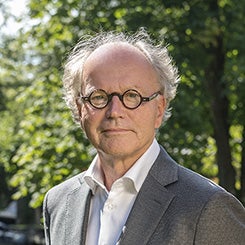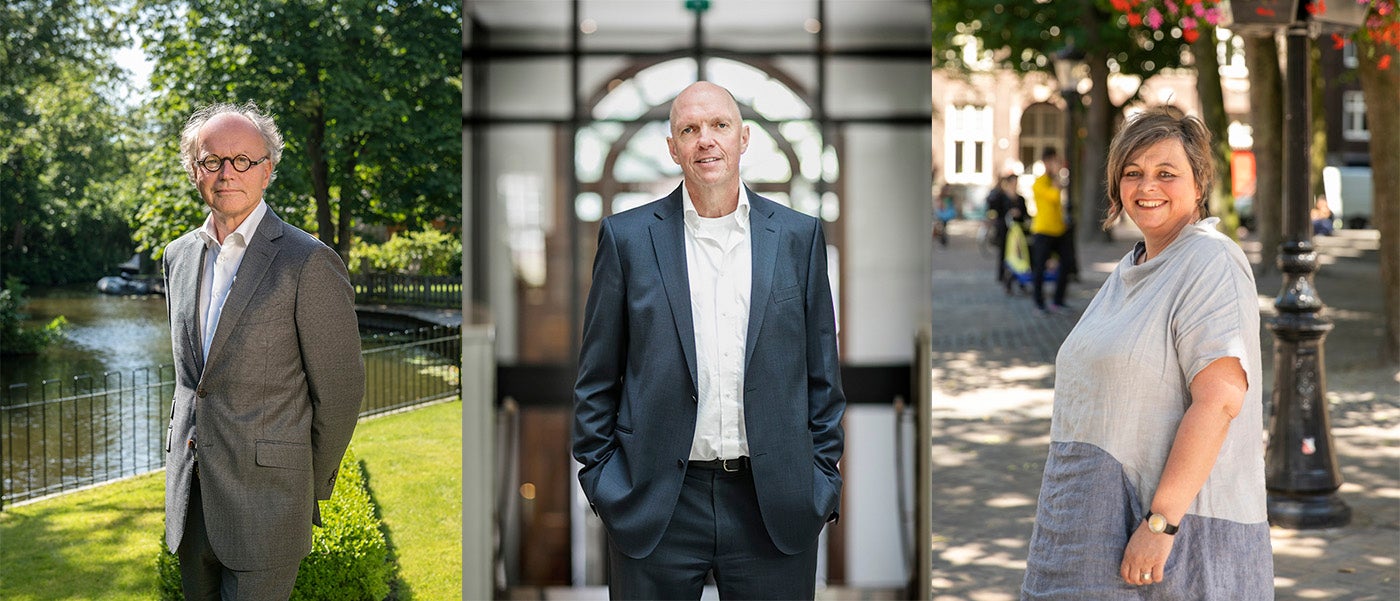The VU now has more than 107,000 alumni. Where did they end up after their studies? In this section, we feature three alumni from the same degree programme. Alumni of the postgraduate degree programme in philanthropy share their stories.
'Theo Schuyt was always full of energy'

Why did you choose this programme? ‘All my life, I have worked for organisations that rely on door-to-door fundraising. The field really appeals to me because it’s full of people who are passionate about doing good. In 2000, I started working as a project advisor at the Jantje Beton foundation. During my time there, I became so enthralled by the world of philanthropy that I decided I wanted to know everything about it. I found this postdoc online.’
So, what did you think? ‘I loved getting to know other people in the field, hearing about their approach to philanthropy and discussing various ethical issues with them. I also enjoyed being challenged intellectually again, forced to learn things that I didn’t understand right away. When someone asks me anything about philanthropy, I always say: “Go do this degree, you’ll love it.”’
Which lecturer will you never forget? ‘When I started, the degree programme was still under development, so the founder, Theo Schuyt, often attended the lectures as well. His enthusiasm about the field was very infectious and he was always full of energy. He had some great stories to tell about the philanthropy sector.’
Where are you working now? ‘At Stem in de Stad in Haarlem, an ecumenical community centre where everyone who needs a little attention or companionship is welcome. We’re there for anyone who needs a helping hand or a listening ear. We organise courses, cook meals and so on. As a funding relationship policy officer, I make sure that we have the money we need to provide this help. I also consult on how we can best spend the money available to us.’
'The exams made me nervous again'

What kind of work do you do? ‘As a consultant, I match business and funds. I try to find an ideal match between charities looking for business partners and businesses looking to commit to a specific goal, such as the environment or healthcare.’
How does one end up in philanthropy? ‘In the 80s, I worked as a consultant at a direct marketing consultancy firm. One day, my boss told me that the MS Research Foundation wanted to start raising funds and was looking for someone to help them do so. He thought the job would be a good fit for me, because I enjoy helping people. As it happened, it turned out to be a very interesting opportunity. Ultimately, I spent 10 years volunteering for them as a fundraiser. In 2009, I decided to turn charities into my job.
Why did you pick this degree programme? ‘Theo Schuyt, who I met at a conference on philanthropy, convinced me. He’s a very enthusiastic man.’
Did you enjoy it? ‘I enjoyed returning to the lecture halls. To my own surprise, I was just as nervous about exams as I had been in the past. There you were, seated in a large room with a couple of sheets of paper in front of you, as you watched the clock tick on until it was time to hand in your work. Despite the fact that I had years of work experience, I felt like a real student once more.’
Do you still see people from your studies? ‘Definitely. I’m on the board of Circle, the association for philanthropy graduates. We organise a few events every year. Last time, one of our members gave us a guided tour of the Rijksmuseum, taking us past all the paintings that referred to philanthropy. I also see Theo Schuyt frequently. After I graduated, he asked me to do a PhD with him. I’m now working on my PhD part-time, in addition to my job, and I expect to complete it later this year.’
'We went on a study trip to the US, the place to be for philanthropy'

What kind of work do you do? ‘I’m a private banker at InsingerGilissen, where I help foundations achieve their financial objectives. I work with the board to help them decide how high they want their returns to be and what risk they want to run. Afterwards, I give them advice on how they can best invest their money.’
Making a profit and achieving social goals, how do these two aims mix? ‘Societal organisations want to do as much as possible, which often translates to spending as much money as possible. I help them keep an eye on their long-term future by advising them to invest part of their funds. Naturally, we make sure that their investments don’t get in the way of their social objectives, ensuring that health funds don’t accidentally make an indirect investment in the tobacco industry, for instance. We try to use investments to create a positive impact.’
What was the high point of your studies? ‘The study trip to the United States, where philanthropy is much more developed than over here, because the government plays a less important role. It’s really the place to be when it comes to philanthropy. With a group of ten students, we visited the Indiana University of Philanthropy in Indianapolis, as well as several institutes, foundations and the American IRS.’
Do you still use what you learned at university? ‘Definitely. I know what matters funds have to deal with, but also what donors consider important. Sustainability is becoming an increasingly important topic to donors, for instance, so I’ll take that into consideration when giving my recommendations. In addition, the spirited lecturers who taught me at the VU have inspired me to pass on my own knowledge as well. I’ve already spent years lecturing about sustainable investing and impact investing for students at Windesheim.
> Read more about the Postgraduate Degree Programme in Philanthropy.
> Professor of Philanthropy Theo Schuyt, who is praised throughout this text, talks about the future of fundraising.
> Between 10-13 July 2018, the VU will host the Conference of the International Society for Third Sector Research (ISTR): the largest conference for academic research on non-profits, civil society, philanthropy and volunteer work in the world.






